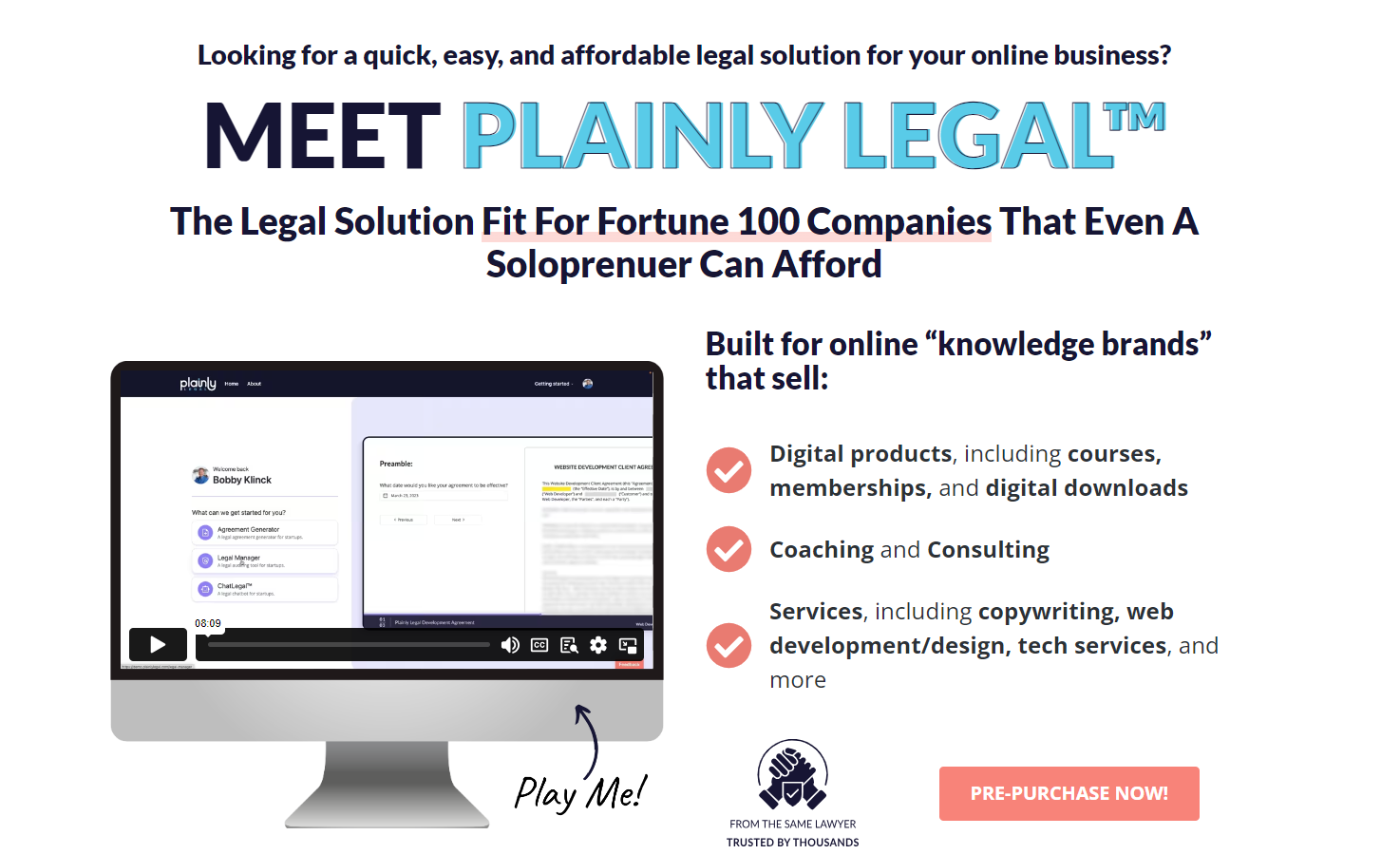Marketing Basics for Start-Ups and Entrepreneurs: What You NEED, Now.
Apr 08, 2023
Click the image below to Listen to Podcast Episode 03 and discover more marketing basics for Startups and Entrepreneurs:
There are certain elements you NEED to have for your business if you want to be perceived as professional, legitimate, and reputable. As in stop what you are doing RIGHT NOW if any of these items aren't in place for your business. This blog is for you if are considering launching a business or still in startup mode.
As someone who has been in marketing my entire career and also someone who has studied marketing from the academic side (I’ve earned a bachelor of science in business administration, specializing in marketing communications from Central Michigan University as well as a dual degree MBA / master of science in marketing from Walsh College, I share this knowledge from experience and from education.
1. Your company logo
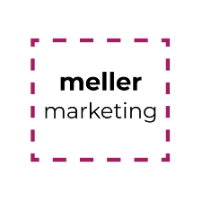
I’ve worked with several clients which had been in business for YEARS without a company logo. One of my very first pieces of advice for them was to get a logo.
You can certainly hire a talented graphic designer to do this for you. Or, if you’re from the DIY mindset and have some time to play with it, check out canva.com. That’s where I created my original Meller Marketing logo.
Since then, I outsourced it to a very talented graphic designer to add some polish. My designer also provided me a high res (EPS) format for printing and other applications, and a circle version instead of square for social media.
2. Your Brand identity
Your logo is part of your identity, but the other elements you need to define are your color palette, your font / typeface, and the tone/voice of your marketing messages.
For Meller Marketing, I landed on a dark pink as a dominant primary color, with other jewel tones as complimentary colors.
I also selected a typeface called Montserrat due in part to the fact that it was a typeface my graphic designer suggested for my logo. It’s a bit different and not all PCs have it loaded, so I have to be careful to convert proposals and presentation materials to PDF. But it does help to set my marketing materials apart.
My tone/voice is approachable, intelligent, but also a bit witty and humorous at times.
I have an inspirational focus to my communications, both on social media and in my proposals. I also provide statistics and data to demonstrate my knowledge and expertise.
In general, I am open to sharing my insights and expertise to help others.
These are all elements of identity which truly define who and what Meller Marketing is and how I want to be perceived by my audiences.
The more well defined your brand identity, the better you will be at creating a consistent look for your company and helping to shape customer perception of your brand.
3. Website
One of the first things people will do if they want to do business with you is look you up online.
- PRO TIP: If your website isn’t live or doesn’t exist at all, they may jump to a quick conclusion that you’re not running a legitimate or professional organization.
Sure, you may be running your business from the kitchen table or a basement home office, but you still need a basic website.
Sure, you may be running your business from the kitchen table or a basement home office, but you still need a basic website.
I recommend starting small and growing your website investment as your business and revenue supports this growth.
There are many great sites out there like wix.com and wordpress.com which offer free and low-cost templates and which have user-friendly pre-made site designs.
Here's a quick peek at my website (mobile view) when I first launched into coaching / consulting full-time in 2018:
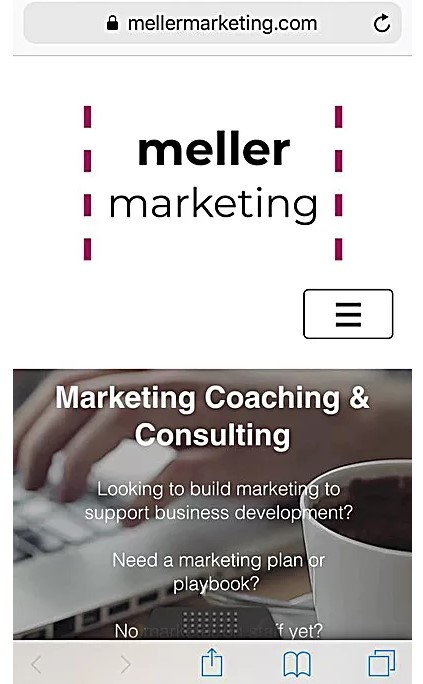
Some designs enable you to pick a color and theme and they build the site for you. All you need to do is add in your products/services, information, and links.
I used Wix for my design when I first launched my business. Now, I'm on Kajabi.
If you don’t want to do it yourself, find someone to build your site for you. Ask around. I can provide referrals.
Before you complete your website, make sure that you have Google Analytics code loaded on your site so you can assess visitor traffic and start measuring data. More on this later, but trust me that you should get Google Analytics set up as soon as you launch your website.
I also recommend some basic site optimization to help you come up in organic search results. Wix offers some guided SEO tools, and any good website designer should help you with SEO for your website optimization.
4. Social media presence
After your potential customer googles you, the next thing they do is go on their favorite social media channels and they look up your business.
Chances are, they are looking for a few things:
- What do you say about your business and how does it match their needs and expectations?
- What do your other customers say about your business, if anything? If you have a Facebook page and you have hundreds or even thousands of followers but reviews aren’t enabled, they may think you’re hiding something.
- They also may look for who else likes/follows/interacts with your page that they know. And then it gets interesting, because they may message or ask those people in person what they think about you and your business. I'm sure those people all LOVE you and will gush about your business.
If they can’t find you on social media, your potential customers may again question whether you are legitimate. Or they may get frustrated and find one of your competitors and shop from them instead.
- If they do find you, and you have a solid social media strategy with good community engagement, they may opt-in to learn more by following your pages, engaging with your posts, and maybe even make a purchase.
While we’re on the subject of social media, there are two other items you should consider:
- Links and cross links
- Researching your competition
Links should be set up from your social media sites pointing to your website, and from your website pointing to social media.
Make social media easy to find and accessible. People usually look at the bottom of your website to find social media icons and links.
Make sure that your website social media links are set to open in a new window. Otherwise, you may have a site visitor who clicks your Facebook link which navigates them to Facebook, where they start on your Facebook business page and then they get distracted by notifications and they leave your page and go elsewhere.
When they’re done, they close the window and your website isn’t loaded anymore. It’s more effort at this point to find the site again, so they may opt not to look you up again.
Try this yourself on your website right now. You may be surprised what you learn. Make sure you check "open in a new window" for these links.
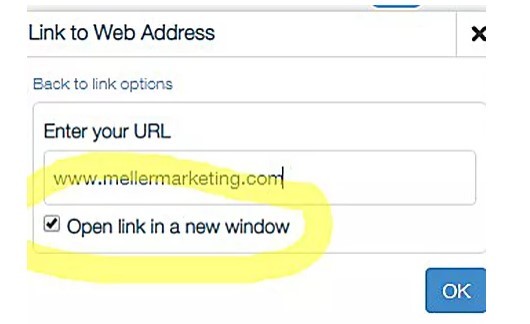
If you’re not sure which social media sites to be on: start by researching your competition.
Think of 2-3 local (or actual) competitors, and 2-3 national (or aspirational) competitors. Do a scan of their website and then the major social media channels. Where are they active? What techniques are most effective for engagement?
The larger, national organizations have invested time, money, and expertise into identifying and managing the best social media channels for their customers. If your customers are similar, chances are their channels should be your social media channels, too.
5. Target audience
Every business has a target audience. “Everyone” is not a target audience.
Sure, I want everyone to be a Meller Marketing customer, but that's just not realistic.
The more specific you can be, the better your odds for success. Think about who is your IDEAL audience. Define as much as you can, such as:
- Gender
- Age
- Geography: where are they located
- Income
- Hobbies, interests, or other facets of their lifestyle
- Behaviors
- Who or what would drive them to consider your product or service
For example, early on one of my target audiences was executive women needing help with their LinkedIn. Their income is typically $200K+, they are aged 45+, they are in the metro Detroit. They are busy executives in senior leadership positions and don't have time to spend learning how to update their LinkedIn profile, but they know they aren't current on their profile. They also know having an outdated profile may be holding them back.
What drives them to me is typically a referral from someone they know. Therefore, I spend a lot of time networking with female executives.
I also spend a lot of time focusing on building up my LinkedIn expertise, so that I can share this with my clients. My LinkedIn dashboard and SSI are two ways I validate this level of expertise:
My LinkedIn Dashboard (when I first launched my full-time business in 2018):

My LinkedIn social selling index (when I first launched my full-time business in 2018):
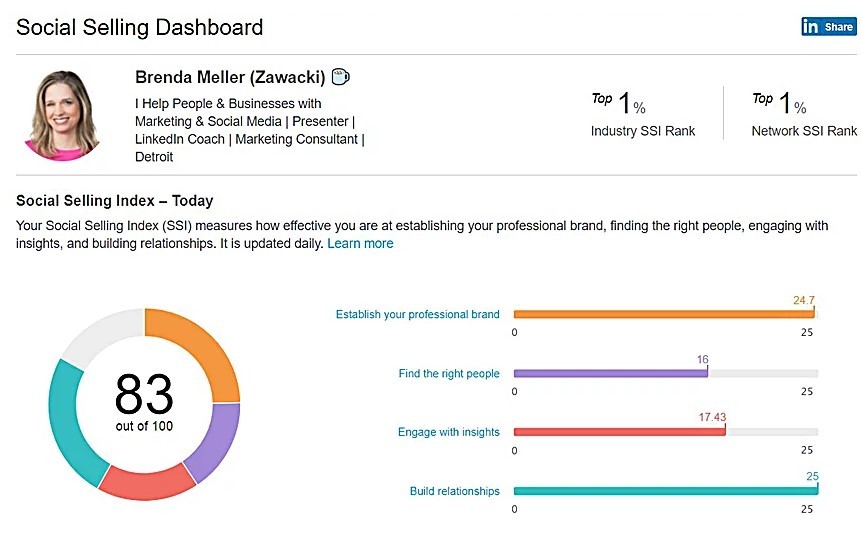
NOTE: As your business evolves, you may be able to get some target audience data from customer feedback and your transactions, but you can also obtain it from your social media analytics and even your website analytics.
6. Products or Services
You need to clearly define what products or services you are offering to your customers. In the beginning, you may start small with just one or two offerings.
You’ll then evolve this based on customer needs, market demand, and other points of differentiation that you can deliver where your customers cannot.
My advice here is be open to any and all products and services that align with your company goals, but don’t be afraid to say no if they don't.
There are a few products/services which aren’t core to what I offer at Meller Marketing. While I can do logo and website design, they aren’t services that I offer. I typically recommend my clients to others for these services.
I also started with a specific list of social media packages and marketing packages, including hourly consulting support.
Several months into my business, a client asked if he could purchase a gift certificate of 20 hours of marketing consulting for his wife for her birthday, and now I offer hours packages as a service offering. Ironically, it’s one of my most popular offerings.
7. Pricing
If you’re an entrepreneur like me who is just getting started, pricing can be tricky. I did a bit of homework to figure out what others in my industry were charging for similar services, but I also set pricing on both my time and level of expertise.
Sure, there are other social media managers out there who may charge less than what I charge, but I bring 20+ years of marketing experience to my clients.
I tell my prospective customers as they are shopping around to look up their agencies and consultants on social media.
See what their customers say. Look at their marketing and messaging.
I’ve learned to price according to my time and expertise, and to set pricing fairly. I’ve also learned to be prepared to walk away from opportunities if we can’t agree on price.
Starting a partnership with negotiating is fine, but not if I feel I’m being short-changed on what I’ll deliver to my clients.
I’ve been focusing on gaining an understanding of what my value is that I bring to my clients, and pricing accordingly. My service is consulting and coaching, and it’s not a commodity. You can’t go to the store or shop Amazon for what I offer.
And you certainly could go on Google, or YouTube, or read books or articles to learn some of what I know for free, but that’s time you’re spending NOT doing what you want to do.
I look at it this way: I could certainly learn how to change the oil in my car, but I have zero desire to do so. I’ll gladly pay someone to do it for me.
My advice for you is figure out how your product or service is different than the competition, and price it accordingly.
8. Contracts and Legal Expertise
I'm not a lawyer but I do recommend you consider getting some contracts and documents set up and reviewed by a lawyer as you are starting your business. I've found it's better to do so at the beginning of a client engagement versus when problems start to occur.
Ask around. You'll find recommendations.
I've found contract templates, then had a lawyer through Legal Shield (a membership service) review them for me.
I now use the legal template library created by Bobby Klinck.
9. Email Address
As soon as you have a branded website (ex: mellermarketing.com), you should get a branded email. Ex: [email protected] vs. [email protected]
People will take you more seriously if you LOOK like a serious business.
You can do this yourself. Just do a Google Search. Or find someone to help set this up for you. I work with Larry Miller at Connected Geek and he has helped me with my website and emails, which I manage through Google Suite.
*****************************************
These are really the starting points of marketing. The next phase involves setting a marketing strategy where you put your marketing plan in place.
You’ll outline your goals, your paths to achieve those goals, metrics or other measurements toward reaching those goals, and a feedback loop to incorporate what you’re hearing from your customers into your product and service evolution.
And that's just the beginning of the story...
Hopefully this helps give you some insights to help you and your business! If you found this helpful, please email me and let me know, and consider sharing this blog with someone who may be starting a business.


